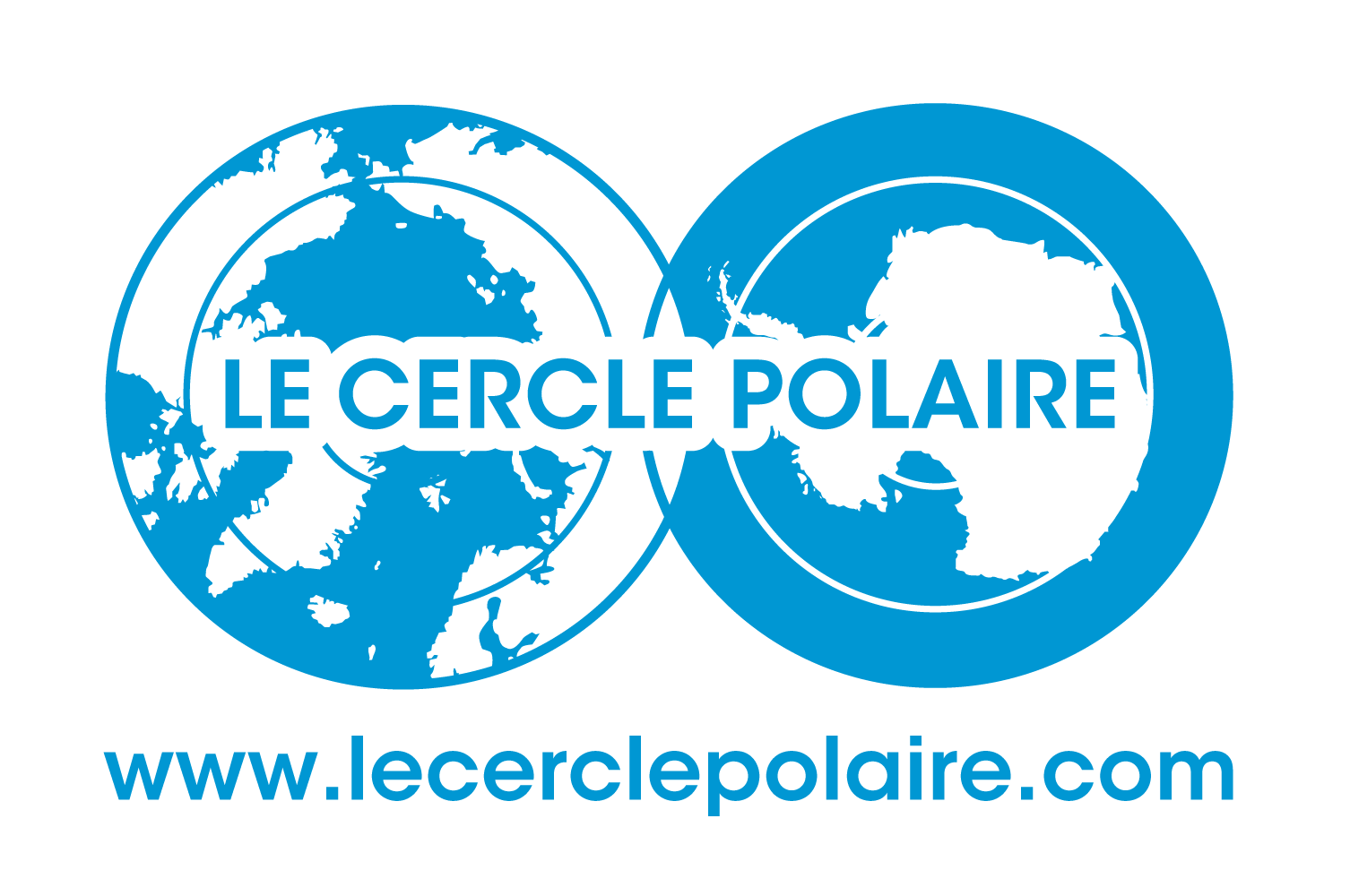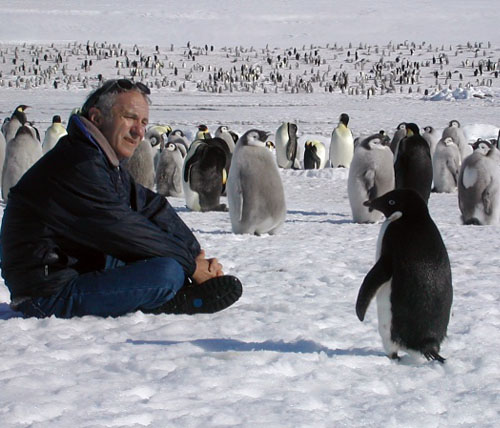![]() Zoologiste • France
Zoologiste • France
Pierre Jouventin est directeur de recherche au centre d’écologie Fonctionnelle et Evolutive (CEFE) du CNRS à Montpellier, dans l’équipe Ecologie Comportementale. Spécialiste de l’éthologie et de l’écologie des oiseaux et des mammifères, il étudie depuis plus de trente cinq ans les stratégies de reproduction de ces vertébrés, en particulier antarctiques et marins (écologie évolutive, écologie comportementale, biologie de la conservation).
Il a découvert cinq espèces d’oiseaux (albatros, manchots, canard, pétrel) et a effectué le premier suivi au monde d’oiseau par balise Argos en 1990. Ses travaux ont aboutit à la mise en évidence expérimentale des systèmes animaux d’identification acoustique, en particulier l’effet cocktail chez le manchot empereur. Il est à l’origine de la réhabilitation écologique des îles Amsterdam et de Saint Paul et de la création en 2006 de la réserve des îles australes (plus grande que toutes les réserves naturelles françaises réunies).
Il a effectué 22 missions de longue durée, le plus souvent dans les Terres Australes et Antarctiques Françaises (75 mois en tout, soit huit ans et demi, dont un hivernage de 14 mois en Terre Adélie), mais aussi en forêt équatoriale.
Page web : www.cefe.cnrs.fr/ecomp/P_Jouventin.htm
Responsabilités administratives
•1985 à 1998 : Directeur de laboratoire CNRS (Centre d’Etudes Biologiques de Chizé, UPR 4701)
• 1990 à 1994 : Secrétaire Général de la Société Française d’Ecologie
• 1992 à 1994: Vice-Président de la Fédération Européenne d’Ecologie
• 1993 à 1997: Chargé de Mission à la Direction des Sciences de la Vie du C.N.R.S
• 1990 à 2000: Membre du Conseil Scientifique et du Comité d’Ethique de l’Institut Français pour la Recherche et la Technologie Polaires
• 1994 à 1998: Responsable du Groupement de Recherche » Ecosystèmes polaires & anthropisation » (Grand Programme Environnement du C.N.R.S.) comprenant 8 équipes et 40 chercheurs
• 1999 à 2007: Responsable de l’équipe « Ecologie comportementale » au C.E.F.E. & du programme ETHOTAAF de l’Institut Polaire P.E.Victor
• 1999 à 2001: Responsable du programme interdisciplinaire « Environnement, Vie et Société » du C.N.R.S. « Les îles australes, observatoires de l’anthropisation accélérée des écosystèmes marins et terrestres »
• 2000 à 2007: Responsable de la « Zone-Atelier de Recherches sur l’Environnement Antarctique et Subantarctique » (Réseau d’observatoires à long terme du C.N.R.S.)
Prix
• 1982 : Lauréat de l’Académie des Sciences (Prix Boisteau-Blutel)
• 1997 : Prix Robert Cushman Murphy de la Colonial Waterbird Society
• 2000 : Prix Mottard de l’Académie des Sciences
• 2001 : Grand Prix du festival international du film scientifique (Nancy)
Communication scientifique
Participation à divers enseignements de DEA. Organisation de six colloques nationaux et internationaux.
Conférencier invité chaque année dans des congrès internationaux et chaque mois dans des manifestations grand public. Nombreux articles de vulgarisation (La Recherche, Pour La Science, etc…).
Coordination de deux volumes « Pour la Science » sur » Les sociétés animales » et « La vie autour de l’antarctique ».
Livres
Un en anglais sur la communication chez les manchots publié en 1982 chez Paul Parey. Un livre collectif sur le ragondin, espèce invasive aux éditions Acta en 1996. En 2001, un livre de vulgarisation ‘Les confessions d’un primate’ aux éditions Belin.
Réalisation de documentaires
• 1985 « Crozet, l’archipel aux 25 millions d’oiseaux »
• 1990 « Le paradoxe des Empereurs » (21 prix dans les festivals internationaux de films scientifiques).
• 1990 « L’Oasis des glaces »
• 1998 « Manchot royal, le retour »
• 1999 « La signature vocale des manchots »
Bibliographie
En 37 années d’activité, 235 ont été publiés, presque tous dans des revues internationales de rang A (3 dans « Nature »).
• Jouventin P., Mouret V. & Bonadonna F. 2007. Wilson’s storm petrels Oceanites oceanicus recognise the olfactory signature of their mate. Ethology. 113 1228–1232
• Jouventin P. 1996 Le patrimoine biologique des T.A.A.F. Le Courrier de la Nature 159: 28-33
• Dobson F. S. & Jouventin P. 2007 How slow breeding can be selected in seabirds: testing Lack’s hypothesis Proc. Roy. Soc. Lond. B. 274: 275-279
• Jouventin P., Charmantier A., Dubois M.P., Jarne P. & Bried J. 2007 Extra-pair paternity in the strongly monogamous Wandering Albatross Diomedea exulans has no apparent benefits for females. Ibis 149: 67-78
• Jouventin P., Cuthbert R. & Ottvall R.. 2006 Genetic isolation and divergence in sexual traits: evidence for the northern rockhopper penguin Eudyptes moseleyi being a sibling species. Molecular Ecology 15:3413-3423
• Nolan P.M., F. Dobson F.S. & Jouventin P. 2006 Immunocompetence is signalled by ornamental color in king penguins Aptenodytes patagonicus. Evolutionary Ecology Research 8 : 1325-1332
• Searby A. & Jouventin P. 2005 The double vocal signature of crested penguins : is the identity coding system of Rockhopper penguins due to phylogeny or ecology ? Journal of Avian Biology 36: 449-460
• Jouventin P. 2005 Les oiseaux marins, modèles d’adaptation ou d’inadaptation ? Courrier de la Nature 240 : 4-10
• Jouventin P., Nolan P.M., Örnborg J., Dobson F.S. 2005 Ultraviolet beak spots in king and emperor penguins. The Condor 107:144-150
• Dresp B., Jouventin P. & Langley K. 2005 UV reflecting photonic microstructures in the King Penguin beak. Biology Letters 1: 310-313
• Bried J., Pontier D. & Jouventin P. 2003 Mate fidelity in monogamous birds: a re-examination of the Procellariiformes. Animal Behaviour 65:235-246
• Jouventin P., Bried J & Micol T. 2003 Insular bird population can be saved from rats: a long term experimental study of Procellaria aequinoctialis on the Crozet archipelago. Polar Biology 26: 371-378
• Jouventin P. 2002 La signature vocale du manchot. Science et Avenir Hors Série 129: 14-19
• Jouventin P., Aubin T. & Searby A. 2002 Le manchot, fantaisie de la nature ou modèle de communication? Pour la Science, N° spécial « La communication animale » 34: 84-89
• Jouventin P. & Dobson S. 2002 Why breed every other year? The case of albatrosses. Proceeding of the Royal Society London B 269: 1955-1961
• Jouventin P. & Aubin T. 2002 Acoustic systems are adapted to breeding ecologies: individual recognition in nesting penguins Pygoscelis adeliae, P. papua. Animal Behaviour 64: 747-757
• Jouventin P. & Bried J. 2001 The effect of mate choice on speciation in snow petrels. Animal Behaviour 62: 123-132
• Jouventin P. 2001 Les îles australes, laboratoires de l’évolution. Pour la Science 285: 32-35
• Charrier I., Mathevon N., Jouventin P. 2001 Mother’s voice recognition onset in fur seal pups. Nature 412 : 873
• Bried J. & Jouventin P. 2001 Site and mate-choice in seabirds: an evolutionary approach. In : Biology of marine birds. Schreiber & Burger Eds, CRC Press, Bola Raton pp 263-305
• Aubin T. & Jouventin P. 2001 How to identify vocally a kin in a crowd? The penguin model. Advances in the study of behavior , Ac. Press, New York 31: 243-277
• Jiguet F. & Jouventin P. 1999 Individual breeding decisions and long-term reproductive strategy in the King Penguin Aptenodytes patagonicus. Ibis 141: 428-433
• Micol T & Jouventin P. 2001 Long-term population trends in seven Antarctic seabirds at Pointe Géologie (Terre Adélie). Human impact compared with environmental change. Polar Biology 24: 175-185
• Jouventin P., Aubin T. & Lengagne T. 1999 Finding a parent in a king penguin colony: the acoustic system of individual recognition. Animal Behaviour 57:1175-1183
• Aubin T. & Jouventin P. 1998 Cocktail-party effect in king penguin colonies. Proceedings of the Royal Society London B 265 : 1665-1673
• Weimerskirch H., Brothers N. & Jouventin P. 1997 Population dynamics of wandering albatrosses Diomedea exulans and Amsterdam albatross D. amsterdamensis in the Indian Ocean and their relationships with longline fisheries : conservation implications. Biol. Conserv. 79: 257-270
• Jouventin P. & Mauget R. 1996 The endocrine basis of the reproductive cycle in the King penguin Aptenodytes patagonicus. Journal of Zoology London 238: 665-678
• Jouventin P. & Lagarde F. 1995 Evolutionary ecology of the king penguin Aptenodytes patatonicus: the self-regulation of the breeding cycle. In » The Penguins : Ecology and Management », Dann, Norman & Reilly, Eds., Surrey Beatty and Sons 80-95
• Micol T. & Jouventin P. 1995 Restoration of Amsterdam Island, South Indian Ocean, following control of feral cattle. Biology Conservation 72: 199-206
• Jouventin P., Capdeville D., Cuenot-Chaillet F. & Boiteau C. 1994 Exploitation of pelagic resources by a non-flying seabird: satellite tracking of the King Penguin throughout the breeding cycle. Marine Ecology Progress Series 106: 11-19
• Viot C.R., Jouventin P. & Bried J. 1993 Population genetics of southern seabirds. Marine Ornithology 21: 1-25
• Weimerskirch H, Stahl J.C. & Jouventin P. 1992 The breeding biology and population dynamics of King Penguins Aptenodytes patagonica on the Crozet Islands. Ibis 134 : 107-117
• Jouventin P. & Weimerskirch H. 1990 Satellite tracking of Wandering albatrosses. Nature 343: 746-748
• Jouventin P., Martinez J. & Roux J.P. 1989 Breeding biology and current status of the Amsterdam Island Albatross Diomedea amstrerdamensis. Ibis 131: 171-189
• Jouventin P. & Viot C.R. 1985 Morphological and genetic variability of Snow Petrels Pagodroma nivea. Ibis 127: 430-441. Jouventin P. & Weimerskirch H. 1984 L’albatros fuligineux à dos sombre (Phoebetria fusca) exemple de stratégie d’adaptation extrême à la vie pélagique. Revue d’Ecologie Terre & Vie 39: 401-429
• Jouventin P & Weimerskirch H. 1984 Les albatros. La Recherche 159: 1228-1240
• Jouventin P. & Roux J.P. 1983 Discovery of a new albatross. Nature 305: 181
• Jouventin P. 1982 Visual and vocal signals in Penguins, their evolution and adaptive characters. Paul PAREY Ed., « Advances in Ethology », 24: 149pp, 56 fig., 19 tabl
• Jouventin P., Stahl J.C. & Weimerskirch H. 1982 La recolonisation des îles Crozet par les otaries (Arctocephalus tropicalis et A. gazella). Mammalia 46: 505-514
• Jouventin P., Monicault G. De & Blosseville J.M. 1981 La danse de l’albatros, Phoebetria fusca. Behaviour 78: 43-80
• Jouventin P. & Mougin J.L. 1981 Les stratégies adaptatives des oiseaux de mer. Revue d’Ecologie Terre & Vie 35: 217-272
• Cornet A. & Jouventin P. 1980 Le phoque de Weddell (Leptonychotes weddelli) à Pointe Géologie et sa plasticité sociale. Mammalia 44: 497-521
• Jouventin P. & Cornet A. 1980 The sociobiology of Pinnipeds. Advances in the Study of Behavior 11: 121-141
• Jouventin P., Le Maho Y. & Mougin J.L. 1980 Les Manchots. Pour la Science 30: 79-91
• Jouventin P. & Cornet A. 1979 La vie sociale des phoques. La Recherche 105: 1058-1066
• Jouventin P., Guillotin M. & Cornet A. 1979 Le chant du Manchot Empereur et sa signification adaptative. Behaviour 70: 231-250
• Jouventin P. 1977 Olfaction in Snow Petrel. The Condor 79: 498-499
• Jouventin P. 1972 Un nouveau système de reconnaissance acoustique chez les oiseaux. Behaviour 43: 176-186

